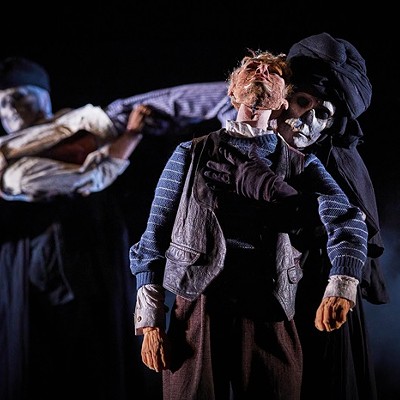About 45 minutes into its first act, The Miser suddenly becomes a comedy. Molière stops introducing new characters, who in turn stop expressing their every thought. The actors loosen up, the gags start to flow, and the audience sighs with relief — because those first 45 minutes are very, very long.
The miser in question is Harpagon, a self-obsessed, penny-pinching old man who prefers the company of his gold to his own two children. He decides to marry a young woman named Marianne, but in a queasy twist, his own son Cléante also wants to marry Marianne. Meanwhile, Harpagon's daughter wants to marry a servant, his coachman is a groveling liar, and everybody covets money and relationships they don't currently have.
The folks at Throughline Theatre clearly love a challenge, having mounted an ambitious August: Osage County last July. And assembling a low-budget version of this 17th-century farce, with all the necessary wigs and baroque furniture, is no small task. Director Jordan Matthew Walsh cuts corners where he can: The stage is simply set with two sofas and some oriental rugs, and the costumes are inventively repurposed trench coats and bathrobes. It's hard to imagine a no-frills interpretation of the frilliest era in French history, but Throughline pulls it off.
Instead of spectacle, this Miser has words — an enormous arrangement of words. To put it gently, Throughline's cast is of extremely mixed abilities, and the translated text is a hardship to speak, much less memorize, in any language. The production's anchor is Warren Ashburn, who as Harpagon plays both a crotchety blowhard and an easily flattered solipsist.
As a comedy, The Miser becomes exponentially funnier over time. The opening is flat and dull, just as the playwright wrote it. Molière is best with snappy one-liners, rapid-fire questions and answers, ridiculous asides and tangled webs of deceit. The Miser's finale is a deus ex machina to end all dei ex machina, a heap of secret aristocrats and pirate battles and missing relatives. The ending is so random, it's as if Molière jammed a second play into the first. But comedy requires surprise, and by the final scene, everybody — dead author and living performers alike — seems to get the joke.














